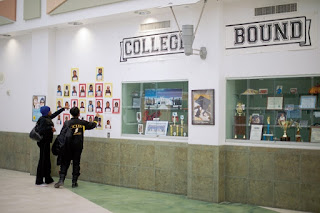Take a look at this month's digest for great articles on current issues and conversations in higher education.
2 Keys to Success for Underprivileged Students: When to Start College, and Where to Go
2 Keys to Success for Underprivileged Students: When to Start College, and Where to Go
A study from Drexel University found that those who started college within a semester of earning their high school diploma were 46% likely to earn a degree within 6 years, as opposed to only 15% for those who postponed matriculation.
The study also found that where the students went mattered. Only 22% of students who entered a community college earned their degree. On the other hand, graduation rates were 53% for public universities and 65% for private universities.
Demographics such as race, high school attendance, grade point average, and the level of turnover at the student’s high school also played a vital role in degree completion. The study shows that this problem requires the attention of not only higher education, but high schools as well.
 |
| Students at Philadelphia High School |
A professor at the City University of New York, Trudy Milburn, is questioning why grades are still used to determine course performance despite widespread skepticism of the usefulness of the grading system.
Milburn argues that grades have become inflated in part due to colleges' reliance on adjunct professors who are judged partly on student evaluations. She states that having students demonstrate a certain level of mastery to pass a course would be a more accurate way of measuring the skills and knowledge a student has gained.
On the other hand, Professor Valen Johnson at Texas A&M University argues that grades are not meaningless because they encourage students to work harder and are an easy way to compare students' performance in a course. However, he is concerned about the trend of grade inflation.
Why a Congresswoman Is Pressing Colleges to Do More on Harassment
Democratic Representative Jackie Speier is working to punish harassment by professors and researchers on campus. She was responsible for pushing legislation to reform harassment in the military and hopes to do the same on college campuses.
Often universities do not punish these perpetrators because of their academic achievement. This causes victims to feel like the system is rigged, and it leaves lifelong scarring for the victims.
Speier also believes academic institutions think they are above the law because they have their own code of conduct. She is now trying to push legislation that would end funding for professors who have committed these acts. This will hopefully cause universities to take these accusations more seriously and be more inclined to punish these professors.
 |
| U.S. Rep. Jackie Speier |
As Big-Data Companies Come to Teaching, a Pioneer Issues a Warning
Candace M. Thille, who helped start the movement to bring big data to college classrooms, is now warning that rapid commercialization can hurt universities.
Adaptive learning is the use of a data-driven algorithm that presents students with the content they are ready to learn next. Although adaptive learning has many potential benefits for professors and students in identifying areas where they struggle, private companies are creating these systems without revealing how they work.
Thille believes that instead of commodifying this technology at such an early stage in its development, universities should be responsible for these adaptive learning systems because universities are better equipped to understand how this learning happens.
Better Advising Beats Free Tuition for Improving Degree Completion, Say Experts
According to a survey of higher education experts, students are more likely to get their degrees if they have access to highly structured curricula and proactive advising than if they get free tuition for the first two years of college.
The experts also believe instructional software that adapts to students’ paces are helpful to their learning. (This is interesting in light of the article about big data above).
A quarter of the experts ranked the current state of undergraduate education as below neutral, and experts cited "institutional culture and structures" far more often than any other reason.
A Piece of UT Austin History
The Battle Oaks, at the corner of 24th and Whitis, are among the oldest trees on UT's campus. They range from 250 to 300 years old and are believed to predate the Civil War.
The trees get their name from Dr. William James Battle who was the chairman of the Faculty Building Committee in 1923. At that time, new biological laboratories were planned to be built on a site that would necessitate the destruction of the trees. However, students and faculty banned together and petitioned for the preservation of the oaks.
Today, Facilities Services takes much care in preserving these beautiful trees as well as all of the trees and plants on our campus. Look for the asset tags on each tree as a sign of the dedication that goes into making our campus a beautiful place to learn and work.
 |
| Battle Oaks on the southeast corner of 24th and Whitis Ave |
 |
| An asset tag like this marks each tree on campus |
Summaries written by Kelsey Thompson and Stephanie Nandlal


Interesting information! Thanks, Kelsey and Stephanie!
ReplyDelete